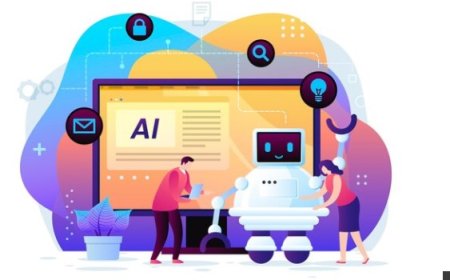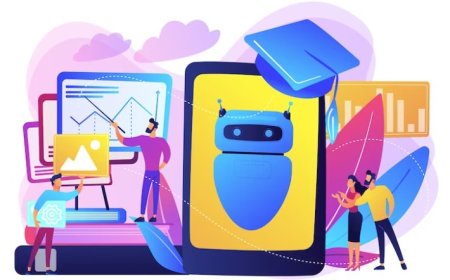Artificial Intelligence Jobs: A Glimpse into Your Tomorrow
AI is changing jobs fast—learn about new roles, skills you need, and how to stay ahead. Don’t miss out on future opportunities—start preparing now!

Imagine this: one morning, you wake up, and instead of trying to start your day, an AI assistant greets you. It plans your schedule, handles boring chores, and even helps you come up with fun and creative ideas. Cool, right?
Now, think about this: what if this AI wasn’t just helping you but also opening doors to brand-new opportunities we can’t even imagine yet?
That’s what got me curious about artificial intelligence and the jobs it’s shaping for the future. As someone who loves exploring new ideas, I started wondering: what will jobs look like in 10, 20, or even 50 years? Will robots replace us, or will humans and AI work together to create a better future? If you’ve ever thought about these things too, let’s dive in and explore what’s coming—and how you can get ready for it.
How AI Is Changing the Job Market
AI is no longer just a trend—it’s all around us. From Netflix suggesting shows you might like to self-driving cars on the road, AI is changing the way we live and work. This has a huge impact on the job market.
Now, you might be wondering: Will AI take all the jobs? The simple answer is no. But it will change the way we work in big ways.
Jobs AI Might Replace
Picture a factory floor where robots work tirelessly, assembling parts with precision. That’s the future of repetitive and routine tasks—automation will handle it. Jobs like data entry, customer service chatbots, and even some forms of transportation (hello, self-driving trucks!) are already seeing significant AI adoption.
But here’s the exciting part: while AI may replace certain tasks, it’s also creating entirely new roles.
The Jobs AI Will Create
When I first started reading about AI, I kept hearing about all the jobs of tomorrow. And trust me, they’re way cooler than I could have ever imagined. Here are just a few roles that will shape the future workforce:
1. AI Developers and Engineers
Role and Responsibilities: AI developers and engineers are responsible for building and maintaining AI systems, such as recommendation algorithms, speech recognition software, and autonomous vehicles. Their tasks include:
-
Designing AI Models: Developing algorithms and models that power AI systems.
-
Training AI: Feeding large datasets into AI models to help them learn patterns and make decisions.
-
Implementing AI Solutions: Deploying AI systems into real-world applications (e.g., integrating AI into apps, websites, or products).
-
Optimizing AI Performance: Continuously testing and improving AI systems for accuracy, speed, and scalability.
-
Collaboration: Working with data scientists, software developers, and other engineers to ensure smooth deployment and integration.
Salary:
-
Entry-level: $80,000 - $100,000 per year
-
Mid-level: $100,000 - $130,000 per year
-
Senior-level: $130,000 - $180,000+ per year
Salaries can vary based on location, experience, and company. Roles in top tech companies (like Google or Microsoft) tend to offer higher salaries.
2. Data Scientists and Machine Learning Specialists
Role and Responsibilities: These professionals analyze vast amounts of data and apply machine learning techniques to extract meaningful insights. They play a key role in improving AI systems:
-
Data Cleaning: Preparing raw data for analysis by cleaning, normalizing, and formatting it.
-
Model Development: Building and optimizing machine learning models for specific tasks (e.g., image recognition, natural language processing).
-
Data Analysis: Using statistical methods and programming languages like Python to analyze trends and patterns.
-
Algorithm Development: Developing algorithms that allow AI to learn from the data and improve over time.
-
Performance Evaluation: Testing and refining models to improve their accuracy and robustness.
Salary:
-
Entry-level: $70,000 - $100,000 per year
-
Mid-level: $100,000 - $130,000 per year
-
Senior-level: $130,000 - $160,000+ per year
Data scientists in highly competitive markets or at large companies (e.g., Amazon, Apple) may earn more, especially if they have advanced skills in specialized areas like deep learning or natural language processing.
3. Ethical AI Officers
Role and Responsibilities: Ethical AI officers ensure that AI technologies are developed and used responsibly, with fairness and transparency. Their tasks include:
-
Ensuring Fairness: Ensuring AI systems do not perpetuate biases or unfairly discriminate against any group.
-
Policy Development: Developing guidelines and policies for the ethical use of AI in businesses and government agencies.
-
Auditing AI Systems: Regularly reviewing AI models to ensure they operate according to ethical standards and legal regulations.
-
Advocating for Privacy: Making sure AI systems respect privacy laws and do not misuse personal data.
-
Collaboration: Working with legal teams, engineers, and data scientists to create ethical frameworks for AI projects.
Salary:
-
Entry-level: $80,000 - $110,000 per year
-
Mid-level: $110,000 - $150,000 per year
-
Senior-level: $150,000 - $200,000+ per year
4. AI Trainers
Role and Responsibilities: AI trainers help AI systems improve by teaching them how to respond, interact, or process information. AI requires constant input to better understand human behavior and respond more naturally. Key tasks include:
-
Training AI Systems: Helping AI systems recognize patterns, such as identifying objects in images or understanding text in chatbots.
-
Providing Feedback: Offering continuous feedback on AI responses to refine its algorithms and make them more accurate.
-
Creating Training Data: Curating datasets that the AI uses to learn how to perform specific tasks.
-
Evaluating AI Performance: Testing AI’s ability to interact with humans and assessing areas for improvement.
-
Collaborating with Developers: Working with engineers and data scientists to improve AI learning based on real-world data.
Salary:
-
Entry-level: $50,000 - $80,000 per year
-
Mid-level: $80,000 - $110,000 per year
-
Senior-level: $110,000 - $140,000 per year
Since this is a niche role, salaries are often lower compared to highly technical AI positions, but they can still be lucrative, especially at major tech firms.
5. Human-AI Collaboration Specialists
Role and Responsibilities: As AI systems become more integrated into the workplace, human-AI collaboration specialists will be responsible for designing workflows that enable humans and AI to work together effectively. Their responsibilities include:
-
Designing Collaboration Models: Creating workflows that allow AI to assist humans in tasks like decision-making, data analysis, or process automation.
-
Training Human Teams: Educating human employees on how to interact with AI systems to maximize efficiency and productivity.
-
Ensuring Smooth Integration: Managing the integration of AI tools into existing workflows without disrupting human roles or productivity.
-
Monitoring AI-Human Interaction: Observing how humans and AI interact, identifying potential challenges, and offering solutions.
-
Continuous Improvement: Analyzing how AI and human collaboration can be optimized over time for better results.
Salary:
-
Entry-level: $70,000 - $90,000 per year
-
Mid-level: $90,000 - $120,000 per year
-
Senior-level: $120,000 - $150,000 per year
The salary varies based on expertise in both AI and organizational processes. Specialists with a deep understanding of human behavior and AI implementation are highly sought after, especially in large tech firms or companies integrating AI into their workflows.

Industries That are Success with AI
I know what you’re thinking: This sounds amazing, but where will these jobs be? Let’s take a quick tour of some industries that are already being transformed by AI:
1. Healthcare
Have you ever heard of AI diagnosing diseases faster than doctors? From analyzing X-rays to personalizing treatment plans, AI is becoming a lifesaver—literally. This is creating opportunities for AI developers, medical data analysts, and bioinformatics specialists.
2. Transportation
We’ve all seen the buzz around self-driving cars. But did you know that AI is also revolutionizing logistics and supply chains? Think about it—every package you order from Amazon relies on AI to find the fastest delivery route.
3. Education
Imagine a classroom where AI tailors lessons to your learning style, helping you master subjects faster. Teachers of tomorrow will work hand-in-hand with AI to create personalized education plans.
4. Entertainment and Gaming
Have you ever played a video game where the enemies seemed to “learn” your strategy? That’s AI in action. From movie recommendations to creating virtual worlds, the entertainment industry is ripe with AI-driven jobs.
5. Agriculture
This one surprised me at first, but it makes so much sense. AI-powered drones and sensors are helping farmers monitor crops, predict weather patterns, and maximize yields.
Skills You’ll Need for AI Jobs
Here’s the million-dollar question: How can you prepare for these jobs?
I’ll be honest—AI-related jobs require a mix of technical and soft skills. But don’t worry; you don’t need to be a coding genius overnight. Let’s break it down:
Technical Skills
-
Programming: Learning languages like Python, R, or Java is a great place to start. These are the tools AI developers use to build and test systems.
-
Machine Learning Frameworks: Tools like TensorFlow and PyTorch make it easier to create AI models.
-
Data Analytics: Understanding how to analyze and interpret data is crucial. Platforms like Excel, SQL, and Tableau can be your stepping stones.
-
Cloud Computing: Many AI systems run on the cloud, so learning platforms like AWS or Google Cloud can give you an edge.
Soft Skills
-
Creativity: AI can handle logic, but creativity is uniquely human.
-
Adaptability: The AI landscape is constantly evolving, so staying flexible and eager to learn is key.
-
Emotional Intelligence: Understanding human behavior will help you work effectively in teams and with AI systems.
-
Critical Thinking: AI can give you data, but interpreting and applying it requires human judgment.
Challenges and Ethical Considerations
Of course, it’s not all smooth sailing. While AI offers incredible potential, it also brings challenges we need to address.
Job Displacement
As AI takes over routine tasks, many people will need to reskill or find new career paths. That’s why it’s so important for students like you to focus on future-proof skills.
Bias and Fairness
Have you ever noticed how some AI tools seem to have biases? That’s because AI systems are only as good as the data they’re trained on. This is where ethical AI experts play a crucial role.
Privacy Concerns
With AI handling so much personal data, ensuring privacy and security will be a top priority.
How You Can Prepare
So, what’s your game plan? Here’s what I recommend:
-
Start Learning Now: Platforms like Skillfloor, Udemy, and LinkedIn Learning offer beginner-friendly courses on AI, programming, and data science.
-
Experiment with AI Tools: Tools like ChatGPT, Google Colab, and AI-powered design software let you get hands-on experience.
-
Join AI Communities: There are countless forums, meetups, and online groups where you can connect with AI enthusiasts.
-
Stay Curious: Read blogs, watch videos, and follow industry leaders to stay updated on the latest trends.
Remember, the goal isn’t to compete with AI—it’s to collaborate with it.
The Future Is Yours
As I reflect on everything I’ve learned about AI and its impact on jobs, one thing is crystal clear: the future is brimming with possibilities. AI isn’t here to take away your opportunities—it’s here to create new ones.
But the key to unlocking these opportunities lies in preparation. As students, you’re in the perfect position to embrace this technological revolution. So stay curious, keep learning, and dream big. Who knows? The next groundbreaking AI system could be created by someone reading this blog.
So, are you ready to step into the future? Because it’s waiting for you.
Recent Developments in AI Job Market and Skills
https://www.businessinsider.com/xai-openai-salary-workers-pay-data-comparison-12-2024?
https://www.thesun.co.uk/money/27825643/how-to-land-your-next-role-in-ai/?




























































